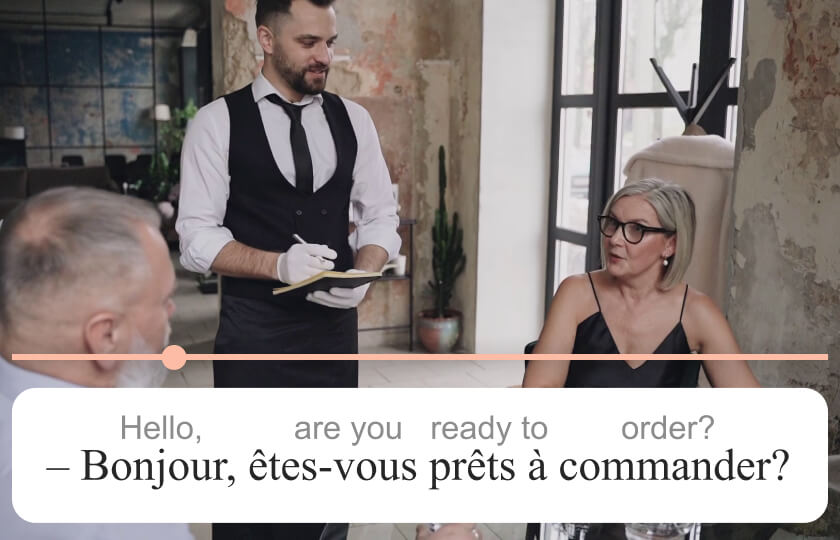
When you think about learning French, the first question that probably comes to mind is, “Is French hard?” This language has a reputation for being beautiful yet challenging, which can make the idea of starting feel a little intimidating.
But here’s the good news: French might not be as hard as you think, especially if you’re an English speaker! While it has its own unique quirks, there are many elements of French that make it surprisingly accessible. In this article, we’ll break down both the easy and hard parts.
How hard is French to learn?
According to the Foreign Service Institute (FSI), which trains U.S. diplomats, French is among the easiest languages for English speakers to learn. The FSI estimates it takes about 30 weeks, or roughly 600-750 study hours, to reach conversational proficiency in French.
Of course, the actual time and difficulty will vary from person to person. Factors like your learning style, dedication, and whether you already know another language can make a big difference. For instance, if you’re familiar with another Romance language like Spanish or Italian, you’ll likely have an easier time with French vocabulary and grammar.
Why French is easier than you might think
Thanks to centuries of shared history and language exchange, French and English have a lot in common. Let’s break down what makes French a great choice for English speakers.
Similar vocabulary
One of the biggest perks of learning French is how familiar much of the vocabulary will feel. It’s estimated that up to 45% of English words have French origins, so you’ll come across many terms you already know, like “justice,” “menu,” or “station.” This overlap means less time memorizing vocabulary and more time putting it to use.
Common sentence structure
French also follows a familiar sentence structure: subject-verb-object, just like English. If you’re putting together a basic sentence, you won’t have to flip words around in a confusing order. And just like in English, French sentences can be expanded with adjectives and adverbs in ways that feel natural.
Familiar alphabet
Another reason French is easier than many other languages is its use of the Latin alphabet, so there’s no need to learn a new script. While French does use accents, like é or è, they’re fairly easy to pick up.
These marks can actually help with pronunciation, signaling how to pronounce a letter or sound slightly differently. As you get comfortable reading French, these accents will become second nature.
Abundant learning resources
Because French is one of the most studied languages in the world, there’s an endless variety of resources available. From language apps to podcasts and YouTube channels, you’ll have access to a wealth of options for different levels and learning styles.
Plenty to French content
One of the best parts about learning French is the vast amount of media available to immerse yourself in the language. With French films, music, and popular shows, you can practice listening skills and experience French culture at the same time.
This content not only helps you get used to spoken French but also makes the learning process more enjoyable. Even without living in a French-speaking country, you can create a rich and immersive environment for yourself.
Why French might be hard to learn
French has its fair share of challenges, especially for beginners. Here’s a look at some of the aspects that make French hard to learn.
Unique pronunciation
French pronunciation can feel intimidating at first. Words include nasal sounds that don’t exist in English, like the sounds in bon (good) or vin (wine). And then there’s the famous French “R,” which has a unique guttural quality that takes practice to master.
Silent letters add another layer of complexity. For example, in parler (to speak), the “r” at the end is silent, which can be confusing. While it may take some time to get a feel for these sounds, the good news is that French pronunciation follows fairly consistent rules.
Gendered nouns
French nouns are either masculine or feminine, which often trips up new learners. Unlike in English, where objects are gender-neutral, in French, even inanimate objects like table (feminine) and bus (masculine) are gendered.
The gender of a noun affects other parts of the sentence, such as adjectives and articles. For example, a green bus is le bus vert, while a green table is la table verte, with different endings depending on the noun’s gender. Remembering which nouns are masculine or feminine is challenging at first, but this knowledge becomes second nature over time.
Verb conjugations
French verbs have a wide range of conjugations based on tense and subject. Unlike English, which keeps verb forms mostly the same, French verbs change endings depending on who is doing the action and when. For instance, the verb manger (to eat) changes as follows: je mange (I eat), nous mangeons (we eat), and ils mangent (they eat).
However, here’s a relief: the most frequently used verbs tend to follow similar patterns. And in spoken French, some verb endings sound the same, even though they look different in writing.
Spelling and homophones
French is not a strictly phonetic language, which means words aren’t always pronounced the way they’re spelled. It’s not as bad as English, but still can feel like a guessing game at first. To make things trickier, French has many homophones — words that sound the same but have different meanings, like vers (toward), verre (glass), and vert (green).
These small distinctions can throw you off, but once you start recognizing patterns and memorizing common words, it becomes easier to identify homophones by context.
Formal vs. informal language
In French, there’s a notable difference between formal and informal language, especially with pronouns. For example, the pronoun tu is used to address friends or family, while vous is reserved for people you don’t know well or want to show respect to, like teachers or colleagues.
This distinction can be confusing because it affects verb forms and sometimes word choice. It’s a subtle but important part of French culture, and knowing when to use formal versus informal language helps avoid misunderstandings.
Native speakers are hard to understand
Even with a good grasp of vocabulary and sentences, the speed of spoken French can feel overwhelming. In addition, French speakers often link words in a process called liaison, blending sounds across words, which makes it hard to pick out individual words.
In casual speech, sounds are often dropped. For example, je ne sais pas (I don’t know) can sound like j’sais pas, with syllables shortened and sounds merged. This natural flow of spoken French is different from classroom French, making it hard to keep up.

Proven strategies to make learning French easier
If French’s quirks seem challenging, don’t worry, there are plenty of strategies to help make the learning process smoother. Here are some tried-and-true tips to get you on the right path.
Start with familiar vocabulary
French and English share many words, like menu, station, and hotel. Starting with these familiar words builds confidence and makes you feel like you’re making progress from day one.
Also, focus on common, everyday words and phrases, such as greetings, questions, numbers, and polite expressions. In the beginning, these will give you the most return on your effort.
Use apps and courses
There are a lot of tools for learning French, from apps and online courses to traditional classes. Many of these resources offer beginner-friendly exercises for grammar, vocabulary, and pronunciation. They can provide a solid foundation, while language exchanges or tutoring offer real-time conversation practice.
Immerse yourself
Immersion is key to learning any language. Once you know some vocabulary, try watching French YouTube, movies, listening to music, or tuning into French podcasts. This exposure will help you get used to the sound and rhythm of the language. Even if you don’t understand everything, your brain will start picking up on pronunciation and intonation patterns over time.
Practice speaking as much as possible
Even if you know only a few words, try forming simple sentences. Find a language exchange partner or a tutor to practice with, or use apps that connect you with native French speakers. The more you practice speaking, the more confident you’ll become in using the language.
Learn the basics of pronunciation early
French pronunciation is quite different from English, practicing it from the start can help it stick and save you from relearning down the line. Focus on the sounds that are unique to French, like nasal vowels and the guttural “R.” Pronunciation videos can be very helpful here, giving you tips to master these sounds.
Set realistic goals
It’s easy to feel overwhelmed if you aim to be fluent right away. Instead, set achievable milestones, like learning a few basic phrases or having a simple conversation. For example, you might aim to introduce yourself, order food, or ask for directions. Meeting small goals will keep you motivated and give you a sense of accomplishment.
Stay consistent
Consistency is one of the most important factors in language learning. Try to practice French daily, even if it’s just for a few minutes. Regular exposure and practice reinforce what you’ve learned and help you retain new skills. Over time, this habit will lead to steady progress.
Why French is worth the effort
Learning French opens up a world of possibilities. From travel and culture to career and personal growth.
Cultural and global significance
After English, French is the most used language in diplomacy. It is an official language for the United Nations and a working language in both the European Union and the African Union. Knowing French allows you to engage with global issues and understand a culture renowned for its contributions to art, philosophy, fashion, and cuisine.
Travel opportunities
French is spoken on 5 continents, in over 27 countries, including places like France, Canada, Belgium, and Switzerland. Knowing French can enhance your travel experience by allowing you to connect with locals, explore off-the-beaten-path locations, and navigate more comfortably. Imagine ordering in a Parisian café or chatting with a local in Montreal, doesn’t it sound nice?
Career benefits
French is highly valued in many industries, especially in international business, hospitality, and tourism. French-speaking skills are in demand across sectors like fashion, art, and international law, and many companies prize bilingual employees for their ability to work with French-speaking clients or partners. If you’re aiming for a global career, French can be a valuable asset that sets you apart.
A personal accomplishment
Learning any new language is an achievement, and French, with its unique sounds and structures, is especially rewarding. Mastering French not only builds your language skills but also deepens your understanding of another culture. This journey can expand your worldview, improve cognitive skills, and give you a sense of pride and accomplishment.
So, is French easy to learn?
It certainly has its tricky parts, like pronunciation and verb conjugations, but it’s also full of familiar elements that make it accessible for English speakers. With shared vocabulary, a similar alphabet, and a wealth of resources available, French is a language you can tackle with a reasonable amount of effort.
Remember, the key to learning French, or any language, is consistency and patience. By setting realistic goals, immersing yourself in French media, and practicing speaking as much as possible, you’ll gradually overcome the challenges and open doors to rich cultural experiences, meaningful travel, and career opportunities you might not have imagined.
Bon courage, and happy learning!

